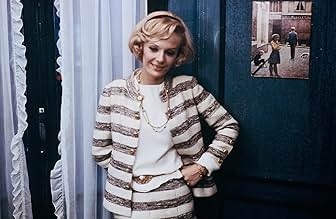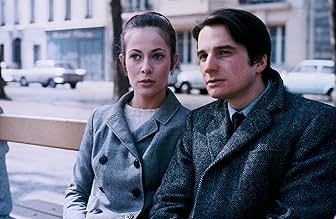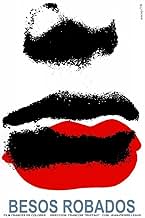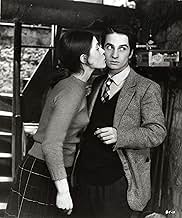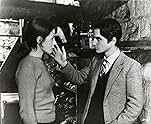Nach seiner Entlassung aus der Armee dreht Antoine Doinel eine Spinnerkomödie, in der er sich auf verschiedene Stellen bewirbt und versucht, seine Beziehungen zu Frauen zu verstehen.Nach seiner Entlassung aus der Armee dreht Antoine Doinel eine Spinnerkomödie, in der er sich auf verschiedene Stellen bewirbt und versucht, seine Beziehungen zu Frauen zu verstehen.Nach seiner Entlassung aus der Armee dreht Antoine Doinel eine Spinnerkomödie, in der er sich auf verschiedene Stellen bewirbt und versucht, seine Beziehungen zu Frauen zu verstehen.
- Für 1 Oscar nominiert
- 5 Gewinne & 7 Nominierungen insgesamt
- Georges Tabard
- (as Michel Lonsdale)
- Albani
- (as Simono)
- Albert Tazzi
- (Nicht genannt)
- Une vendeuse du magasin de chaussures
- (Nicht genannt)
Empfohlene Bewertungen
Antoine finds a job as a night porter in a hotel in Paris, thanks to Christine's father's recommendation, a comely Christine visits him one night, she greets him on the new job and seems casually happy but not so enthusiastic. Soon he is fired for being an unwitting helper of a private detective Henri (Harry-Max), who instead introduces him to the new exciting line of business managed by Monsieur Blady (Falcon). Antoine starts his new vocation with great passion although his stalking skill is a far cry from professional. Truffaut's perspicacious insight of urban savvy is brought to the fore in this segment, mainly surrounding two cases, a subtle love triangle about a (closeted) man looking for his magician lover and a more detailed inside-job, where Antoine is assigned to undercover in a shoe shop owned by Georges Tabard (Lonsdale, a great scene-stealer), who wants the agency to find out why he is so disliked by everyone around him, but the irony is that during Georges' loquacious introduction of his background, the reason behind that is pretty crystal-clear. During the course, Antoine is hopelessly having a crush with Georges' wife Fabienne (Seyrig, enigmatic and fabulously seductive), the apotheosis of a woman's sheer perfection. He is torn between his unquenchable fascination to Fabienne and the on-and-off relationship with Christine, which extracts the most vehement outburst in the mirror scenes where Antoine's unfitting characteristic is pungently reflected, with the iterations of self-persuasion and self-boost, to no avail. Eventually after tasting the temptation, which costs him the second job, he reconciles with Christine in the cutesy chapter where he works as a TV repairman, but the uncertainty of his own feelings becomes more pronounced in the coda, where a stalker makes a wanton confession to Christine in the presence of Antoine, both dismiss at him on the spot, but think twice, it is the capriciousness of love and emotions that will certainly puzzle Antoine, and trigger every viewer, to discover what will happen to him and Christine later, aka. in BED & BOARD (1970), approximately after a two-years spell.
STOLEN KISSES is charming in its carefree tempo and disarming in its frankness about whimsical triviality, it is not a major or challenging piece of work from Truffaut, but still scintillates with the profundity of a intelligent life-observer, an obliging humorist and an inspiring filmmaker.
In the beginning of the film, Antoine is dishonorably discharged from the army and thus his job hunt begins. He's really not very good as a gift-wrapper, or as the night watchman at a hotel, or as a private detective. The detective job takes up most of the film. He is dispatched to work undercover in a shoe shop to find out why nobody likes the boss. He falls head over heels for the boss' stunningly beautiful wife Fabienne. We also see Antoine dealing with his on-again, off-again relationship with his girlfriend Christine, who wants him when he doesn't want her, and vice versa.
Accompanied by a beautiful music score and set in '60s Paris, "Stolen Kisses" is a whimsical, sometimes cynical film about different levels of love (often existing in one relationship), the search for self, and for loving the unattainable. The follow-up is "Bed and Board."
Standing by itself, Stolen Kisses is a terrific film about a mediocrity. Antoine can't hold a job, and he can't even hold a woman. He kisses his girlfriend as he would kiss a prostitute - awkward and rough. Upon meeting a private detective (modeled after Andre Bazin - Truffaut's mentor), Antoine gets a job spying on the workers of a shoe store owner who claims everyone hates him. There, he falls into lust with the bosses high-society wife.
At the end of the film, Antoine is forced to compromise and marry his old girlfriend for whom he may or may not feel any true love. The point is that she is there to support him and love him. He is the elevated statue of desire to her just as the shoe store owner's wife was to him.
All in all, this movie is exceedingly well done by the Great Truffaut, but I just couldn't get past the fact that Antoine was the same boy I last saw escaping from a juvenille hall and running to the ocean in a moment of personal victory from a society that didn't really want him. Something in this film did not match up with the previous one.
Wusstest du schon
- WissenswertesThe original French title of the film comes from a line in Charles Trenet's song "Que reste-t-il de nos amours?" which is also used as the film's signature tune.
- PatzerWhen talking with Madame Carbon, Antoine is preparing a piece of cheese with mustard, but after the cut to a different angle, he is holding his glass of wine instead.
- Zitate
Georges Tabard: Do you speak English, Antoine?
Antoine Doinel: I'm learning from records, but it's not easy.
Georges Tabard: Records are a joke. There's only one way to learn: in bed with an English girl. It's time you learned. I learned with an Australian girl while her husband was at work painting houses.
Fabienne Tabard: Like Hitler.
Georges Tabard: Don't ever say Hitler was a housepainter. That's slander. Hitler painted landscapes.
- Crazy CreditsInstead of including "The lily in the valley" by Honoré de Balzac in the writing credits, François Truffaut shows the main character reading a book with a cover that says '"The lily in the valley" by Honoré de Balzac'.
- VerbindungenFeatured in Introduction to Truffaut Season (1972)
- SoundtracksQue Reste-t-il de nos Amours ?
Music by Charles Trenet and Léo Chauliac
Lyrics by Charles Trenet
Performed by Charles Trenet
Top-Auswahl
- How long is Stolen Kisses?Powered by Alexa
Details
- Erscheinungsdatum
- Herkunftsland
- Offizieller Standort
- Sprachen
- Auch bekannt als
- Stolen Kisses
- Drehorte
- 15 Rue de Steinkerque, Paris 18, Paris, Frankreich(exteriors: Antoine's apartment facing Sacré Coeur)
- Produktionsfirmen
- Weitere beteiligte Unternehmen bei IMDbPro anzeigen
Box Office
- Budget
- 350.000 $ (geschätzt)
- Bruttoertrag in den USA und Kanada
- 509 $
- Eröffnungswochenende in den USA und in Kanada
- 11.206 $
- 25. Apr. 1999
- Weltweiter Bruttoertrag
- 509 $

![Bande-annonce [OV] ansehen](https://m.media-amazon.com/images/M/MV5BMDA4YTUxMjAtMDMwNi00MWY1LTllZTgtZTQzZjRlMjE1NWEwXkEyXkFqcGdeQXRyYW5zY29kZS13b3JrZmxvdw@@._V1_QL75_UX500_CR0)
